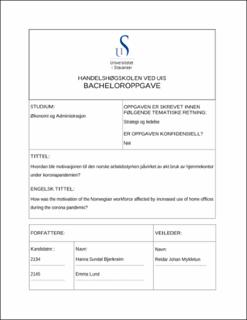| dc.contributor.advisor | Mykletun, Johan, Reidar. | |
| dc.contributor.author | Lund, Emma. | |
| dc.contributor.author | Bjerkreim, Sundal, Hanna. | |
| dc.date.accessioned | 2023-06-27T15:53:05Z | |
| dc.date.available | 2023-06-27T15:53:05Z | |
| dc.date.issued | 2023 | |
| dc.identifier | no.uis:inspera:145995936:70181258 | |
| dc.identifier.uri | https://hdl.handle.net/11250/3073664 | |
| dc.description.abstract | Hensikten med oppgaven er å finne svar på hvordan motivasjonen til den norske arbeidsstyrken ble påvirket av økt bruk av hjemmekontor under koronapandemien.
Det teoretiske rammeverket belyser ulike sider ved dagens arbeidsliv, blant annet hvordan den teknologiske utviklingen åpner mulighetene og endrer forutsetningene for digitalt arbeid. Det gis en kort introduksjon til begrepene engasjement, trivsel og motivasjon, før tre ulike motivasjonsteorier presenteres. Hovedteorien for oppgaven er selvdetermineringsteorien som tar utgangspunkt i de psykologiske behovene autonomi, sosial tilknytning og kompetanse. Ut over denne brukes Maslows behovshierarki og Herzbergs tofaktorteori for å støtte opp under hovedteorien.
For å svare på problemstillingen brukes en kvantitativ tilnærming hvor det tas utgangspunkt i data innhentet av Norstat Norge gjennom en spørreundersøkelse uført i september 2021. Spørreundersøkelsen kartlegger hvordan ansatte ble påvirket under koronapandemien og består av 1531 deltakere, representative for den norske arbeidsstyrken. Ut fra disse dataene blir motivasjon undersøkt ved hjelp av de to avhengige variablene «engasjement» og «trivsel». En korrelasjonsanalyse undersøker sammenhengen mellom disse to og flere uavhengige variabler som forsøker å måle autonomi, sosial tilknytning og kompetanse. Korrelasjonsanalysen hjelper også med å forstå hvordan de ulike variablene korrelerer med hjemmekontor. Reliabiliteten og validiteten til alle skalaene i oppgaven er testet med Cronbach`s alfa og faktoranalyse.
Resultatene fra korrelasjonsanalysen viser positive sammenhenger mellom engasjement og trivsel på ene siden, og autonomi, sosial tilknytning og kompetanse på den andre siden. Analysen viser også at autonomi og sosial tilknytning i stor grad oppleves på hjemmekontor, mens hjemmekontor og kompetanse derimot har en negativ sammenheng. Dette tyder på at mestringstroen blir mindre ved økt bruk av hjemmekontor. Det konkluderes med at motivasjonen til den norske arbeidsstyrken samlet sett ble positivt påvirket ved økt bruk av hjemmekontor under koronapandemien, spesielt når det kommer til de to motivasjonsfremmende faktorene autonomi og sosial tilknytning. | |
| dc.description.abstract | This thesis aims to investigate how the motivation of the Norwegian workforce was affected by increased use of home offices during the corona pandemic.
The theoretical framework sheds light on various aspects of today's working life, including how technological development creates opportunities and changes the prerequisites for digital work. A brief introduction to engagement, well-being and motivation is given, before three different theories of motivation are presented. The main theory for the thesis is the self-determination theory, which is based on the psychological needs of autonomy, relatedness, and competence. In addition to this, Maslow's hierarchy of needs and Herzberg's two-factor theory are used to support the main theory.
To answer the research question, a quantitative approach is used. The thesis is based on data collected by Norstat Norge through a survey conducted in September 2021. The survey investigate how employees were affected during the corona pandemic and consists of 1,531 participants representing the Norwegian workforce. Based on this data, motivation is examined using the dependent variables “engagement” and “well-being”. A correlation analysis is used to investigate the connection between these and several independent variables that attempt to measure autonomy, relatedness, and competence. The correlation analysis also examinate how the various variables correlate with home office. The reliability and validity of all the scales used in the thesis have been tested with Cronbach's alpha and a factor analysis.
The results from the correlation analysis show positive relationships between engagement and well-being on the one hand, and autonomy, relatedness, and competence on the other hand. The analysis also shows that autonomy and relatedness are experienced to a large extent when working from home. Home office and competence, on the other hand, have a negative relationship. This means that self-efficacy decreases with increased use of a home office. The thesis concludes that the motivation of the Norwegian workforce was positively affected by the increased use of home offices during the corona pandemic, especially when it comes to autonomy and relatedness. | |
| dc.language | nob | |
| dc.publisher | uis | |
| dc.title | Hvordan ble motivasjonen til den norske arbeidsstyrken påvirket av økt bruk av hjemmekontor under koronapandemien? | |
| dc.type | Bachelor thesis | |
